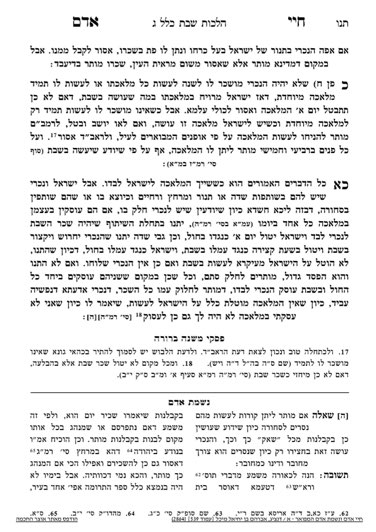We are beginning siman 21, where the Chayei Adam discusses another type of relationship between a Jew and non-Jew. Until now, we have discussed three types of relationships:
Kablan, where the non-Jew is not paid per job and is not paid until he has finished the job. While he is working, he is considered working for himself in order to get the job done and be paid.
Sechir yom, where the non-Jew is paid hourly or daily, regardless of the amount of work completed.
Aris, a sharecropper or profit sharing arrangement, where the non-Jew receives a percentage of the profits.
Today, we will discuss a non-Jewish business partner.
The Chayei Adam writes that the cases we have discussed until now (including the eight criteria discussed at length) apply between a Jewish employer and non-Jewish employee. If a Jew and non-Jew together own an item, such as a bathhouse, millstone, or oven (which was rented out to others), or they buy and sell merchandise, the considerations will be different.
The Chayei Adam writes that if the Jew and non-Jew themselves work for the business, and take turns working on a regular basis, there is no issue of chashad or maris ayin if the business is open on Shabbos, because people know the business is owned by both of them.
However, we need to discuss the work and profits. Clearly, the non-Jew will be doing the work on Shabbos. If the arrangement is that each owner takes the profits for the day that he works, and the other person has no rights to it at all, the Jew has no connection at all to the shabbos work of the non-Jew.
However, if the Jew wants to have some compensation for the fact that the non-Jew works on Shabbos, other arrangements have to be made. If, at the beginning of the shutfus, they arrange for the rights to work on Shabbos belong solely to the non-Jew, and a different day belongs solely to the Jew, it is muttar.This arrangement works specifically because the arrangement was established before the business started; meaning, it was before the Jew had rights to the profits made from Shabbos. That being the case, the Jew taking the profits from a day during the week is not in exchange for the profits from Shabbos, because the Jew did not yet have ownership in the profits of Shabbos when making this arrangement, so the Jew is not considered benefitting from the non-Jew on Shabbos. This works for a scenario where there are direct profits from each day of work. An example of this is a store.
The Chayei Adam writes that when a Jew and non-Jew are partners in a field, the profits of each day are not clear as they are in a store. However, we can calculate that there is a certain portion of the profits which could be attributed to the work the non-Jew performed on Shabbos (e.g., 1/7th of the produce), so the non-Jew will take that amount of profit, and the Jew will take the profits of a different day during the week correspondingly. Again, they must make this arrangement beforehand, but once they do so, the Jew had no ownership in the profits from Shabbos when they made the arrangement, so he is not benefitting from the non-Jew’s work on Shabbos.
We will discuss a modern version of this concept in the upcoming shiurim, be’ezras Hashem.
Summary
-
When a Jew and non-Jew are business partners, the Jew cannot benefit from the profits on the non-Jew made on Shabbos. This can be avoided by each partner only retaining the profits from the days they work. If they split the profits equally, they should stipulate before beginning the partnership that the non-Jew retains the profits from Shabbos, and the Jew retains the profits from a corresponding day during the week.



